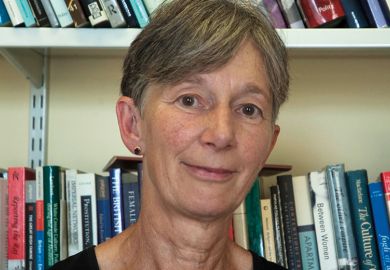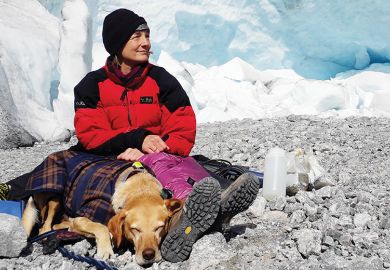Arun Kumar is assistant professor in modern British imperial, colonial and postcolonial history at the University of Nottingham. He has founded a community library in his family home in Kalyanpur, in the northern Indian state of Uttar Pradesh, serving a population of 4,000 farmers, shopkeepers and homemakers.
When and where were you born?
I was born in the winter of 1991, the year the Indian economy and polity witnessed liberalisation. My parents lived in a village in Uttar Pradesh not yet reached by hospitals. My mom says that I was born in a Jeep rushing to the district hospital.
How has this shaped who you are?
The rural nature and the rusticity of a north Indian village life has shaped me in many ways, both in its strengths and weaknesses. My father served in the Central Reserve Police Forces as a constable, while the women of the family not only managed the household but they – the old and the unmarried female members – looked after the family fields and harvest. Back then, each house in the village was also a small cotton-spinning workshop, with my mother and grandmother waking up at 4am to spin cotton on their electric-run cotton wheels. I would wake up with them and study while they spun cotton. I grew up seeing how peasants managed their household, and how they thought of labour, poverty, inequality and injustice. All these themes inform my research on working-class and caste histories. Being in a village also meant that we had little access to “correct” information and proper channels when it came to education. My family had a very instrumentalist understanding of education. For them, textbooks, exams and grades led you to employment and beyond the uncertainties of a peasant economic life. Because my father was in the Central Police, he got a regular income, which meant that I could attend a decent school in the town. Decent here means where the classes would happen regularly. Most of my village friends had to drop their studies at some point either because of economic compulsion or lack of proper information about education and career choices. We were all living a rural middle-class dream of getting junior-level government jobs but many of my village friends are now either informal labourers – vegetable sellers, washermen or shop attendants – in Delhi and Bombay, or independent small shopkeepers. The false promises of a neoliberal rural education through cheap private schools destroyed the self-confidence of many. We are back to where we started. But this time, I thought having a village library would make a small change to the lives of a new generation.
What are you hoping the library will achieve?
Lack of quality books at the village level made me realise that rural kids are in a disadvantaged position compared with their city peers who do well in higher education because of their quality schooling, socio-economic backgrounds and access to world-class literature. In addition, there are no separate study rooms in rural homes. Kids either study in the open courtyard (aangan) or in busy rooms. Our library offers quality textbooks, Hindi and English literature, competitive exam books and children’s books. The library, as we had wished, has become a space of learning, for exchange of ideas, and a supportive environment.
How have you funded the library?
I am funding the everyday costs of the library with my savings. Friends order books from time to time. In the beginning, a few friends supported by ordering various things for the library, like chairs, benches and bookshelves.
How did you find a path from Kalyanpur to the University of Delhi?
I grew up like any other peasant boy except that our family had access to a regular salary through my father. I was given light farming work because I was good at studies, but more so because I was a boy. My aunt, who was older than me by a few years, always rightly complained that she was not given the same advantages. Patriarchy shapes north Indian households in ways that put girls of the house in disadvantaged positions. I felt it, but never understood it as a kid. It hurts me even now. Despite doing most of the farming work, my aunt, now married, has managed to become a nurse. We are good friends. After my secondary school education, my father happened to be posted in Delhi on special duty and we had a person from our village working for the library of the Hindu College of Delhi University. He gave my father the idea of me attending university. My father was unhappy that I chose to do a humanities degree. Unfortunately, only STEM degrees possess the magic of social status and higher intelligence in India. I got admitted to a decent but posh University of Delhi college, the Delhi College of Arts & Commerce, for a history degree. Coming from a village as a Hindi student, it was a shock. I had never been outside my village. The history cohort of the college was a mix, which made it easy to make some good friends. Although the intellectual environment was not the best at that time, my teachers were very supportive.
Tell us about your research.
My work breaks the myth that Indian working classes/castes were illiterate, which was beautifully constructed by colonial officials and later taken up by labour and education history. I show that a number of “low-caste” artisans, Dalit labourers and factory workers attended schools and dreamed of careers beyond labouring. Since literacy rates were so low during the British colonial period in India – because the colonial state did not invest in compulsory education as the British had in their own country since the 1870s – histories of these very few workers acquire an important role, because they demolish various elite analytical discourses and received academic knowledge.
john.morgan@timeshighereducation.com
Appointments
Rebecca Blank will be the next president of Northwestern University. Currently chancellor of the University of Wisconsin-Madison, Dr Blank will be Northwestern’s first female president when she succeeds Morton Schapiro in summer 2022. An economist renowned for her research on poverty, Dr Blank was on the Northwestern faculty for a decade from 1989. She has been an adviser in three US presidential administrations and was deputy secretary of commerce under Barack Obama. Peter Barris, vice-chair of Northwestern’s trustees, hailed Dr Blank as “a proven collaborative and bold leader”.
Andrew Jones has been named vice-chancellor of Brunel University London. Currently deputy president of City, University of London, Professor Jones will succeed Julia Buckingham in January 2022. The economic geographer was previously dean of the School of Arts and Social Sciences and vice-president (research and enterprise) at City. Mike Spyer, chair of Brunel’s council, said Professor Jones “brings a wealth of experience of the HE sector and has a deep understanding of the issues, social and academic, that are unique to London”.
Grant Edwards will start his tenure as vice-chancellor of New Zealand’s Lincoln University in January 2022. He is current deputy vice-chancellor, and was previously dean of the Faculty of Agriculture and Life Sciences.
Hazel Carby is joining the London School of Economics and Political Science as centennial professor in the International Inequalities Institute. She is currently Charles C. and Dorothea S. Dilley professor emeritus of African American studies and professor emeritus of American studies at Yale University.
Paul Bissell has been appointed pro vice-chancellor for research and innovation at the University of Chester. He is currently dean of the School of Human and Health Sciences at the University of Huddersfield.
Danny Liew will be the next dean of Adelaide Medical School, part of the University of Adelaide. He is currently deputy head (education and enterprise) of Monash University School of Public Health and Preventive Medicine.
Register to continue
Why register?
- Registration is free and only takes a moment
- Once registered, you can read 3 articles a month
- Sign up for our newsletter
Subscribe
Or subscribe for unlimited access to:
- Unlimited access to news, views, insights & reviews
- Digital editions
- Digital access to THE’s university and college rankings analysis
Already registered or a current subscriber?




